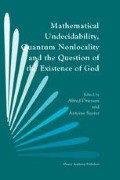Abstract
What is scientism? It may be defined as a philosophical interpretation of modern science. In other words, scientism is not science but a philosophical view of science. It is based on the assumption that one day, in the future, science will be able to understand everything. One day human beings will enjoy absolute and total knowledge of the world. And this knowledge will imply an unlimited power and would finally lead to complete happiness. As a consequence, the idea of God is of no further help for man, because hope for a better future will have become obsolete.
Access this chapter
Tax calculation will be finalised at checkout
Purchases are for personal use only
Preview
Unable to display preview. Download preview PDF.
Notes
Louis de Broglie: “Les idées qui me guident dans mes recherches”, Albin-Michel, Paris, 1966, in Un itinéraire scientifique, p. 149, Editions La Découverte, Paris, 1987.
Plato, Timaeus 90 a-e.
Aristotle, De philosophia, Fr. 10 R.
Thomas Aquinas, Summa Theologica I, quaest. 2, art. 3.
The Bible, Psalm 18.
Thomas Aquinas, op. cit., I, quaest. 2, art. 3.
Laplace, Essai philosophique sur les probabilités, p. 3, Gauthiers-Villars, Paris, 1921.
Auguste Comte, op. cit., Lesson 2, p. 64.
Auguste Comte, op. cit., Lesson 3, p. 76.
Auguste Comte, op. cit., Lesson 1, p. 39.
Auguste Comte, op. cit., Lesson 1, p. 39.
W.A. Mozart, “The Magic Flute”, Act two, Scene. 7, No. 21 Finale.
Pierre-Gilles de Gennes, Les objets fragiles, pp. 231–232, Plon, Paris, 1994.
Pierre-Gilles de Gennes, op. cit., p. 232.
Pierre-Gilles de Gennes, op. cit., pp. 232–233.
Cf. Plato, The Republic, Book VII.
Pierre-Gilles de Germes, op. cit., p. 14.
Author information
Authors and Affiliations
Editor information
Editors and Affiliations
Rights and permissions
Copyright information
© 1997 Springer Science+Business Media Dordrecht
About this chapter
Cite this chapter
Laeuffer, J. (1997). Scientism and Scientific Knowledge of Things and God. In: Driessen, A., Suarez, A. (eds) Mathematical Undecidability, Quantum Nonlocality and the Question of the Existence of God. Springer, Dordrecht. https://doi.org/10.1007/978-94-011-5428-4_12
Download citation
DOI: https://doi.org/10.1007/978-94-011-5428-4_12
Publisher Name: Springer, Dordrecht
Print ISBN: 978-94-010-6283-1
Online ISBN: 978-94-011-5428-4
eBook Packages: Springer Book Archive

